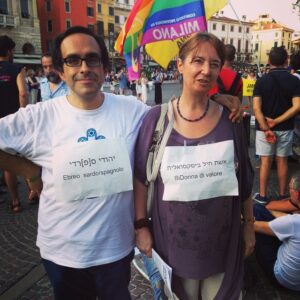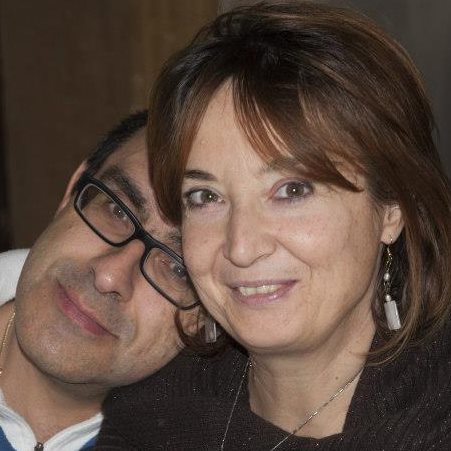Interview by Robyn Ochs
Luigia Sasso is the bisexual chairwoman of Lieviti, the only Bisexual, Pansexual and Queer association in Italy, so far. She was born in Verona, but grew up in a small country town where she spent her childhood. She attended high school in Verona, where she was introduced to big city life, and discovered “values” different from those in the countryside. But she still carries within herself the healthy values from the farming world.
Luigia married at 25, became a mother at 30 and three years later gave birth to her second daughter. Up until then, her life was the one of a typical bourgeois woman with a family and a job (she works as a technical collaborator and computer programmer in a health institution in the Verona province), like all the women she knew.
I interviewed Luigia by email:
How did you get from your traditional life to the life you are living today?
Had fate so willed it, I would have continued that way forever. The catalyst for change was separating from my husband, with whom I couldn’t get along anymore. I felt different from my peers. I had wonderful girlfriends, and, unlike other women, I always chose to socialize with women rather than with men. I spoke about my same-sex attraction with a colleague, and admitted that I wanted to test whether I was just longing for transgression, or it was my “inner ego” expressing itself.
I was 40 when this colleague introduced me to Rita, who then became my partner. She changed my life, and we were together for 10 years.
These were very busy years, full of adventure, public demonstrations and lesbian activism. I legally established the Veronese chapter of Arcilesbica [the main Italian lesbian association]. I chaired it for many years, and I can say that all this changed me a lot. From a reserved, somewhat shy and bourgeois employee, I became a militant advocate for LGBT rights.
Then when I was 50, the relationship with Rita had become unhealthy because it was too conflictive. I kept fighting with her, and I grew closer to a good, thoughtful and very learned man in whose presence I always felt a sense of great serenity and peace. This was what I had been looking for. My dire need for a family and for peace brought me so close to Raffaele that I eventually married him.
It was through this relationship that I became aware that I was bisexual. With Raffaele, I wasn’t the self-definedheterosexual-until-40-Luigia, but a different Luigia with a new self-awareness I had acquired thanks to my cultural and social experiences in the lesbian world. I wasn’t therefore “reverting to heterosexuality,” but rather “progressing towards bisexuality.”
Italy has a reputation as a very Catholic country. What is your religious background, and what impact did this have on your coming out?
I received a strong Catholic upbringing. This Catholic baggage made me suffer a lot, up to triggering a strong rage and aggressiveness towards that world which made me feel “elected” (as a bourgeois mother) until 40, and after 41 a “depraved sinner,” so wicked that I was unworthy of raising my children. I left Catholicism, which was oppressive and detrimental to my self-esteem, to embrace a different and more welcoming religion. I’m now a Waldensian [an Italian Protestant denomination], and this has given me a lot of opportunities.
What terms are used in Italian to describe bi, pansexual or queer people? Are these words equivalent to their English counterparts, or do they have a different meaning?
Bisessuale = Bisexual; Pansessuale = Pansexual; Queer and Bi have the same form in both languages. The meaning of all these words is also identical.
That said, bi people are non-existent in Italy. The prejudice stating that a person is either straight or gay/lesbian is still widespread. Bisexuality is more spoken about among trans people. In Siena [Tuscany] there is a self-defined pansexual group [www.movimentopansessuale.it/], and in Milan there is an association that has a lot of bisexuals [www.milkmilano. com]; then there is obviously our group here in Verona, but we don’t know anyone else. I think that most bi people present themselves either as gay or lesbian to prevent discrimination, and some (actually, a few) people may present themselves as queer.
What rights are accorded to LGBT people in Italy? What progress is being made?
I’ve been an activist for the last 10 years, and, to tell the truth, I’m really disappointed, because we haven’t attained anything politically. Perhaps we aimed too low, and got less than nothing. On the other hand, public opinion has changed. While there was a lot of gay bashing (certainly because of the Catholic culture), the climate has become more welcoming and accepting. There are some extremists, like the Sentinelle in piedi [literally, “Standing sentinels,” the Italian version of the French movement La Manif Pour Tous], but, in my opinion, it is just a reaction to an already settled change.
Are bi folks well-integrated into Italy’s sexual minority community?
Alas, bi people aren’t accepted as such, and they often pass as gay or lesbian to prevent being “othered.” There is still a lot of work to do.
You are chairwoman of Lieviti. What does the word “Lieviti” signify?
“Lieviti” literally means “Yeast.” Yeast can change their sex (or better, “mating type”) at will, so we loved to choose an anti-binary and sex/genderfluid organism as an eponym.
And please tell us about this organization.
We want to increase the resilience, self-worth and dignity of all minorities (especially sexual minorities, especially those belonging to the bisexual spectrum) through counseling, cultural initiatives and political action. We have joined Verona Pride, which will hold its parade on June 6th, 2015, striving to increase bi visibility.
We now meet weekly, on Thursdays at Casa di Ramia, a municipal institution which is supposed to help migrant women (but, since our mayor Flavio Tosi has been sentenced to two months’ imprisonment, with probation, for hate speech against Roma people, there is little surprise that Casa di Ramia is forced to rely only on volunteer work and funds); there we used to hold Kundalini Yoga courses, and we’re now teaching something akin to Laughter Yoga.
From time to time we join forces with the Milk Verona LGBT Community Center, the main Veronese LGBT association, to hold cultural events.
Our mailing list has 45 members, most of them living in or near Verona.
Meeting participation is quite varied: our self-help group drew from 5 to 15 people, while the cultural events organized together with Milk Verona draw 20 to 25.
We advertise our activities via Facebook or through leaflets spread across town. We’ve also become allies to the UDU, the main students’ association in the University of Verona, so we are organizing a couple of lectures on LGBT families (and even one on the ’Ndrangheta, the most powerful criminal organization in the world, and the most homophobic one in Italy). We do our best when we cooperate with other organizations – the upcoming Pride is a wonderful occasion.
What bi resources are available in the Italian language?
There is next to nothing. We’ve translated the Open University’s Report on Bisexuality, and we’re translating Shiri Eisner’s book, Bi: Notes for a Bisexual Revolution, even though we’re more liberal than radical. There is a Wiki project on Queer sexualities (http://www.wikipink.org) and Raffaele has authored the entry on bisexualit.
Are you in contact with bi activists in other countries? Do you see a value in transnational activism?
Raffaele has quite a good command of English, but I use it rarely. Raffaele acts as our “Minister of Foreign Affairs.” He corresponds with some European activists in the EuroBiNet Facebook group, and he is managing our joining ILGA [International Gay & Lesbian Association]. Transnational activism is certainly useful – when you learn that bisexuals in France, Holland, Israel, Italy, Serbia, Spain, the UK, the US, etc., go through the very same experiences, you understand that bisexuality exists and is not an artifact.
Thank you, Luigia, for your time. Do you have any last words?
Diversity enriches.
With special thanks to Raffaele Yona for serving as a linguistic bridge for this interview.


